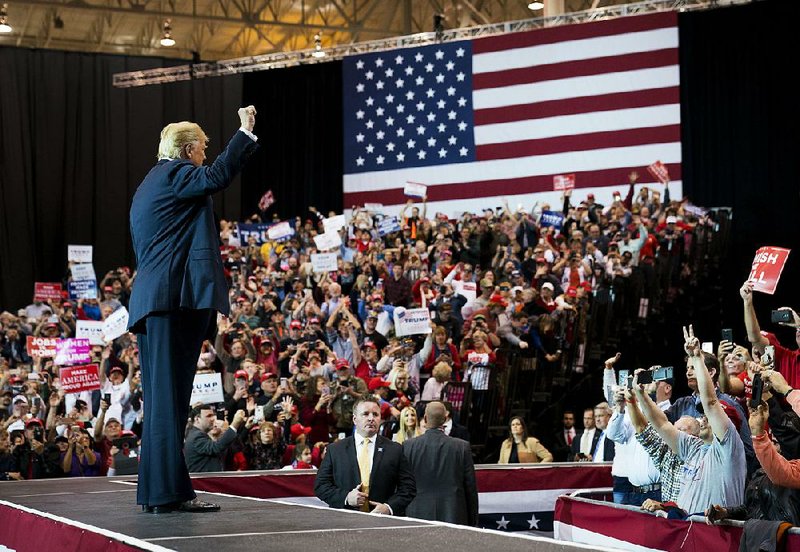WASHINGTON -- On the eve of the midterm election, Democrats and Republicans scrambled Monday to make their last-minute appeals in a campaign marked by rhetoric about illegal immigration and a debate over the presidency of Donald Trump.
At stake is control of Congress, 36 governorships and hundreds of down-ballot races nationwide.
Trump called for voters to "unite behind our proud and righteous destiny as Americans" by supporting Republicans in today's election, a final attempt to energize his base amid signs of trouble for some GOP candidates.
Trump was upbeat Monday afternoon as he addressed the first of three final rallies in Ohio, Indiana and Missouri on the eve of the midterms. He has used apocalyptic rhetoric in recent days to describe what's at stake for the country.
"We are going to work, we are going to fight, we are going to win, win, win," he told supporters in Cleveland.
At a Northern Virginia campaign rally, former President Barack Obama said the election will define the soul of America, as other Democrats accused Trump of fearmongering.
"The character of this country is on the ballot," Obama said, his voice hoarse from a flurry of campaign stops around the country. "The politics we expect is on the ballot. How we conduct ourselves in public life is on the ballot."
"You're going out there, you're going to make sure that people vote to start making things better," Obama said during a visit with volunteers working to encourage voter turnout. "And when you do that, then the spirit of America is going to shine. All right? Let's get to work."
Trump's final three-state swing focused on states that will be key to the new Senate majority. Trump has acknowledged that Democrats could win the House, where they would need a net gain of 23 seats. GOP officials and strategists voiced cautious optimism Monday about keeping the Senate. Democrats would need a net gain of two seats, but they are defending 10 seats in states won by the president two years ago.
The two parties were also tangling in several closely watched governors' races, including in Midwest battleground states such as Wisconsin, Ohio, Iowa and Michigan. Florida and Georgia, meanwhile, could make history by electing their states' first black governors -- and leading Democrats such as Obama made special pitches for Andrew Gillum in Florida and Stacey Abrams in Georgia in the final days.
Earlier Monday, Trump framed the vote as a referendum on his presidency so far, pointing to several accomplishments but saying "it's all fragile. Everything I told you about, it can be undone and changed by the Democrats if they get in."
"In a certain way, I am on the ballot," Trump said in a phone call with supporters. "Whether we consider it or not, the press is very much considering it a referendum on me and us as a movement."
While campaigning in Ohio, Trump declared that "everything is at stake" as he sought to bolster the campaign of Ohio Attorney General Mike DeWine, the Republican candidate for governor.
In recent weeks, the president has focused his messaging on illegal immigration, the caravan of migrants making its way toward the U.S.-Mexico border and the possibility of voter fraud.
On Monday, he added economic issues, writing in an op-ed on the Fox News website that "America faces a critical choice" in Tuesday's midterm elections and claims that Democrats, if they win control of Congress, will "take a giant wrecking ball to your economy and your future."
"The contrast in this election could not be more clear," Trump said later Monday. "Democrats produce mobs. That's what's happened. Republicans produce jobs."
As he lambasted his rivals on the campaign trail, Trump struck a gentler note in an interview Monday with local media conglomerate Sinclair Broadcasting, saying he regretted some of his rhetoric.
"I would like to have a much softer tone. I feel to a certain extent I have no choice, but maybe I do," Trump said.
The softer tone was seen when the president paused his final rally of the day Monday in Cape Girardeau, Mo., for about five minutes during a medical emergency. Trump said, "Take your time. Take your time. Relax," as emergency workers made their way to a woman in the crowd of thousands.
The audience spontaneously broke into the hymn "Amazing Grace."
After the supporter was taken out of the arena, Trump said of the singing, "That was beautiful."
HOUSE, SENATE RACES
Both parties spent Monday closely monitoring the handful of battleground races that will determine control of the House and Senate.
Democrats entered the final full day of campaigning expressing confidence that they'll score the seats needed to take control of the House for the first time since 2010.
Both sides agree, at least privately, that Republicans are strongly favored to keep control of the Senate, where the electoral map is highly favorable to them. In both Senate and House races, Democrats have focused heavily on health care and protecting people with pre-existing conditions.
Polls showed Senate races in Arizona, Nevada, Missouri, Indiana and Florida all within the margin of error, with those in Montana and Texas also tight.
In the battle for the upper chamber, GOP operatives watched amid signs of a tightening race between incumbent Sen. Claire McCaskill, D-Mo., and state attorney general Josh Hawley, a Republican.
Trump's final rally was meant to give Hawley one more boost. With no early voting option in the state, the outcome will be decided by how voters feel today.
Republican leaders have been confident about flipping a Senate seat in North Dakota, where GOP Rep. Kevin Cramer has led incumbent Democratic Sen. Heidi Heitkamp in polling.
But there was far less certainty about the likely outcomes in other competitive contests. GOP operatives noted that the broader political mood in some battleground races seemed to be moving in Democrats' favor, at least marginally.
[2018 ELECTION: Full Democrat-Gazette coverage of Arkansas races]
The Justice Department announced Monday that it would deploy personnel to 35 jurisdictions in 19 states to "monitor compliance with voting rights laws," a move that was viewed with suspicion and alarm by voting-rights advocates.
Trump tweeted that law enforcement has been "strongly notified" to watch for illegal voting and that anyone "caught" would be subject to the "Maximum Criminal Penalties allowed by law."
"Given Trump's past animus toward immigrants and minorities, it's certainly not a stretch to think these warnings about illegal voting along with DOJ's announcement could be intimidating to voters and scare them from the polls," said Sophia Lin Lakin, a staff attorney with the American Civil Liberties Union's Voting Rights Project.
On immigration, Trump has been equally aggressive, calling the migrant caravan an "invasion."
"That's an invasion. I don't care what they say," Trump said Monday of the thousands of migrants marching toward the U.S.-Mexico border.
Cynthia Jurado, a 22-year-old political independent from Des Moines, Iowa, said Monday that she's voting against Republicans in part because of this kind of rhetoric on immigration.
"Nowadays I see a lot of racism," she said. "My family experienced some of it as well. This started happening after the presidential election and I don't think people should have to fear."
Jurado said her parents and a lot of her relatives are immigrants.
"They're very nice people. It's not true that they're rapists or anything. I'm trying to get my voice out for them as well," she said.
HEAVY VOTER TURNOUT
As candidates, surrogates, outside groups and the two parties frantically worked to turn out their voters, strategists for each party agreed the outcome will be determined by the composition of an electorate that's showing signs of being larger than normal for a midterm year.
Some areas of the country are already experiencing unprecedented turnout.
In El Paso, Texas, for instance, the 12-day early voting period that ended Friday saw 139,000 residents cast ballots -- more than three times the 2014 early voting turnout. The town has historically had among the lowest turnout rates among major U.S. cities, but it is now on track to at least double its total 2014 turnout of 82,000 votes.
El Paso is home to Democratic Rep. Beto O'Rourke, whose challenge to Republican incumbent Sen. Ted Cruz has drawn national attention and a cascade of cash from both parties' donors.
Minnesota has seen a similar jump in voter numbers, with more than 539,000 ballots cast so far, a whopping 129 percent increase from 2014. Secretary of State Steve Simon, a Democrat, tweeted that the state was "on the verge of shattering the old record by surpassing the raw total for 2016."
At an early voting center in Eagan, Minn., the parking lot was already full Monday morning after a weekend of long lines. Many voters said they were eager to weigh in on Minnesota's hotly contested race pitting Republican Rep. Jason Lewis against Democrat Angie Craig in the 2nd Congressional District.
Jeff Schuette, 54, a Republican stockbroker from Eagan, called the race a bellwether for the country. If Lewis wins, Schuette said, he thinks Republicans will hold the House.
"It's so close," Schuette said. "Every race is to the wire."
At the same polling place, Joe Panzarella, 42, said he saw his votes for Democrats as a check on Trump.
"No one's controlling him. He needs to be stopped," said Panzarella, adding that Trump's inflammatory rhetoric is "getting out of hand" and inciting violence.
"It's completely wrong. [He's] racist, against women, LGBT, immigrants," he said.
Information for this article was contributed by John Wagner, Cleve R. Wootson Jr., William Wan, Elise Viebeck, Anne Gearan, Robert Moore, Alex Schuman, Felicia Sonmez, Sean Sullivan, Torey Van Oot, and Vanessa Williams of The Washington Post; by Ken Thomas, Jill Colvin, Russ Bynum, Ben Nadler, Jonathan Lemire, Catherine Lucey and Zeke Miller of The Associated Press; and by John McCormick, Mark Niquette, Toluse Olorunnipa and Gerry Smith of Bloomberg News.
A Section on 11/06/2018


